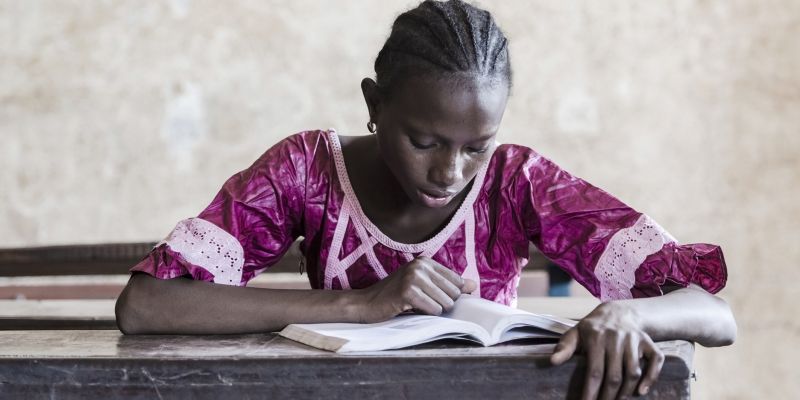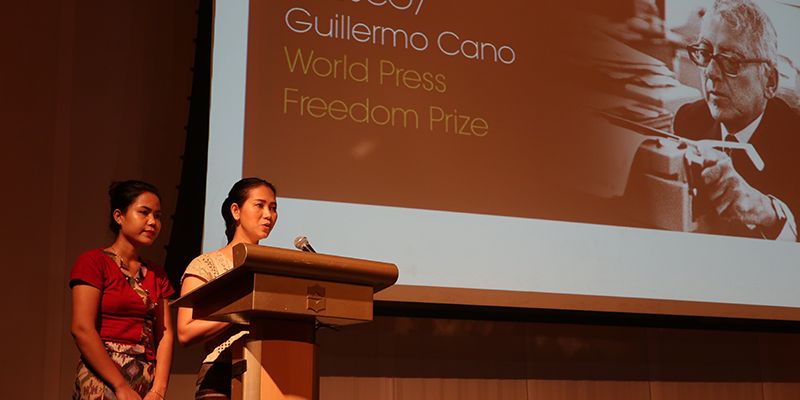Girls’ education in STEM: The facts
Help us draw attention to the challenges faced by girls in pursuing STEM education and careers, by sharing one or more of the many messages below, using the hashtags #GirlsCrackTheCode #BrightGirls
All images can be downloaded here http://bit.ly/2w5fHgA
There will be 7 million new STEM jobs in Europe by 2025 and not enough people to fill them
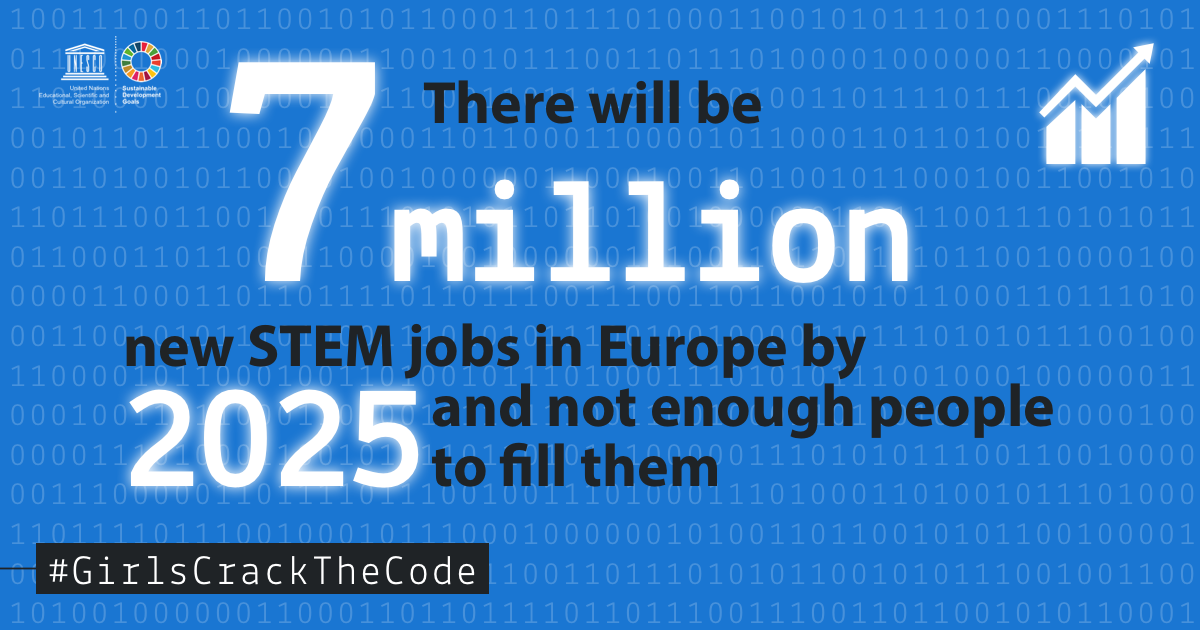
Post
Careers in science, technology, engineering and maths (STEM) are considered the jobs of the future, with the European Parliament forecasting around 7 million new STEM jobs by 2025 in Europe alone. To fill these jobs and keep pushing the boundaries of what has been thought possible in STEM, both girls and boys, women and men need equal access to STEM education and careers. Get this and other facts about women in STEM at http://bit.ly/2wazTw1
These facts will be explored further at UNESCO’s International Symposium and Policy Forum ‘Cracking the Code: Girls’ Education in STEM’ (Bangkok, 28-30 August 2017). Find out more at http://bit.ly/2seiliH #GirlsCrackTheCode #BrightGirls
Tweets
Getting #WomenInSTEM is crucial to filling the projected 7m new STEM jobs by 2025 in Europe #GirlsCrackTheCode http://bit.ly/2wazTw1
Girls need equal access to #STEM education in order to help fill the shortfall in Europe by 2025 #GirlsCrackTheCode http://bit.ly/2wazTw1
2.5 million new engineers needed in Sub-Saharan Africa to achieve SDG6
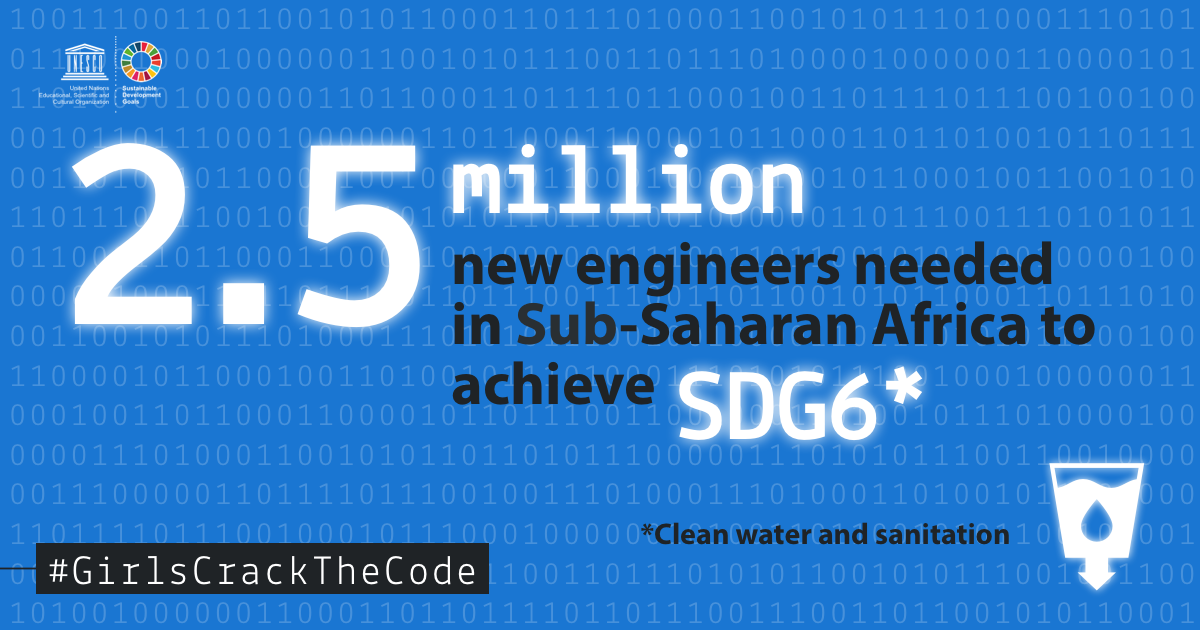
Post
2.5 million new engineers and technicians will be needed in Sub-Saharan Africa if we are to achieve the Sustainable Development Goal (SDG) of improving access to clean water and sanitation. A further nine of the SDGs require science and technical knowledge. Men alone cannot make up the shortfall of engineers, technologists, mathematicians and scientists needed to achieve these goals. Get this and other facts about women in STEM at http://bit.ly/2wazTw1
These facts will be explored further at UNESCO’s International Symposium and Policy Forum ‘Cracking the Code: Girls’ Education in STEM’ in Bangkok, 28-30 August. Find out more at http://bit.ly/2seiliH #GirlsCrackTheCode #BrightGirls
Tweets
Women are needed to help make up the 2.5m shortfall of engineers in Sub-Saharan Africa #GirlsCrackTheCode http://bit.ly/2wazTw1 @UNESCO
We cannot achieve the @UN #SDGs without getting more women and girls into #STEM #GirlsCrackTheCode http://bit.ly/2wazTw1 #BrightGirls
Only 17 women have been awarded a Nobel Prize in physics, chemistry or medicine since 1903
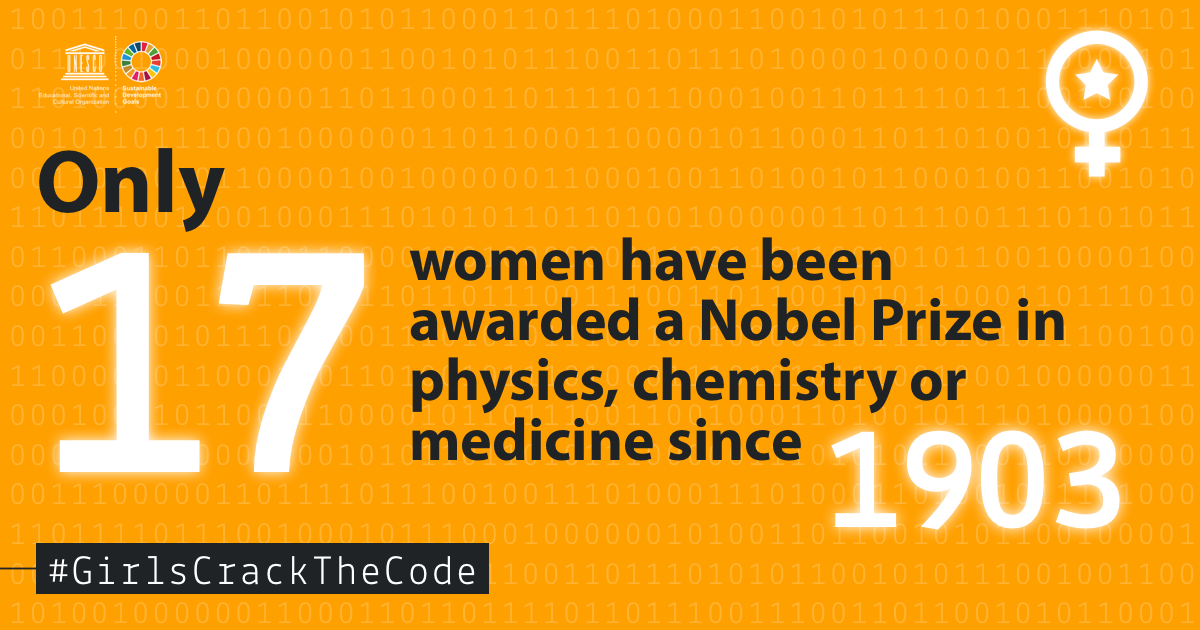
Post
That’s compared to 572 men over the same period. Far too often, brilliant women find themselves sidelined. Take Jocelyn Bell Burnell for example; an astrophysicist, she detected the first radio pulsar in the late 1960s, but it was her two male colleagues who were awarded the Nobel Prize in 1974. Get this and other facts about women in STEM at http://bit.ly/2wazTw1
These facts will be explored further at UNESCO’s International Symposium and Policy Forum ‘Cracking the Code: Girls’ Education in STEM’ (Bangkok, 28-30 August 2017). Find out more at http://bit.ly/2seiliH #GirlsCrackTheCode #BrightGirls
Tweets
572 men have won the the Nobel Prize physics, chemistry or medicine but only 17 women. #GirlsCrackTheCode http://bit.ly/2wazTw1
Far too few #WomenInSTEM are being rewarded with the top prizes in their fields #CrackingTheCode http://bit.ly/2wazTw1 @UNESCO
Only 3% of ICT graduates worldwide are women
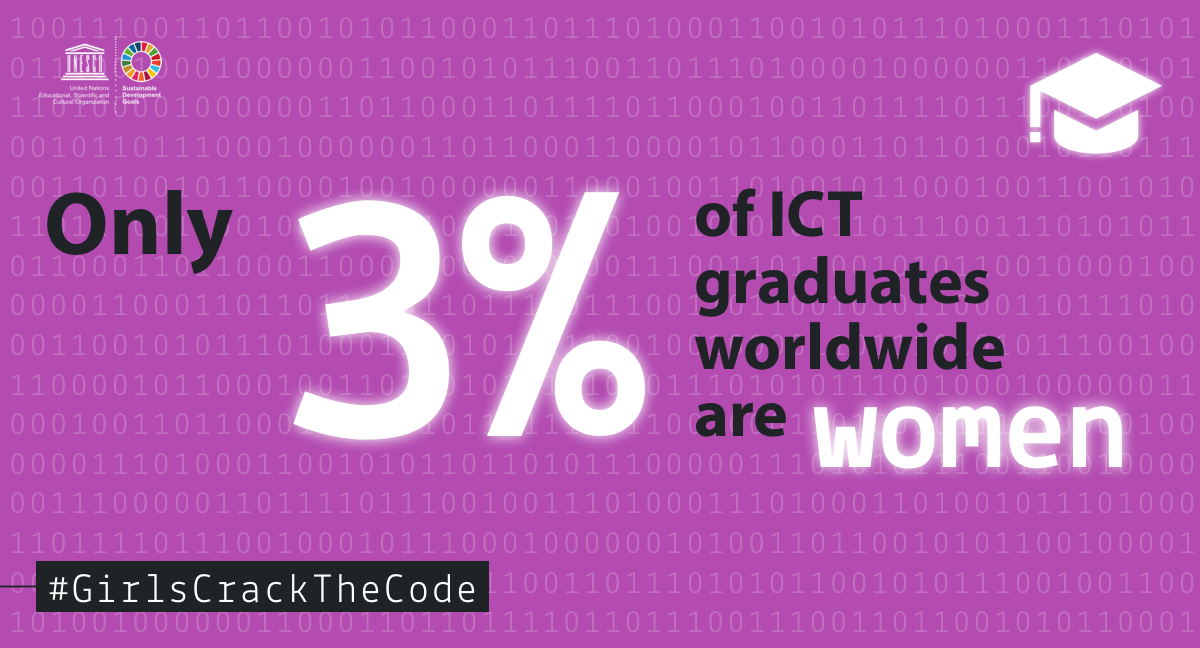
Post
Only 3% of ICT graduates worldwide are women. Gender inequality, out-dated stereotypes and limited promotion of STEM (science, technology, engineering and maths) education for girls are just some of the factors at play. Get this and other facts about women in STEM at http://bit.ly/2wazTw1
These facts will be explored further at UNESCO’s International Symposium and Policy Forum ‘Cracking the Code: Girls’ Education in STEM’ in Bangkok, 28-30 August. Find out more at http://bit.ly/2seiliH #GirlsCrackTheCode #BrightGirls
Tweets
Does not compute: New UNESCO publication shows only 3% of ICT graduates worldwide are women. #GirlsCrackTheCode http://bit.ly/2wazTw1
Gender inequality, out-dated stereotypes & limited promotion of #STEM to girls fuel a lack of women in UK tech http://bit.ly/2wazTw1
Only 35% of higher education students studying STEM subjects are women

Post
We recently reported how preschool teachers often evaluate girls’ ability in maths as lower than boys’ ability even when girls are actually performing similarly. This perception that boys are somehow naturally better at maths and other STEM subjects results in many girls being discouraged from selecting STEM subjects as they progress to higher levels of education. A UK study found that by the age of 18, only 19% of girls were participating in advanced STEM studies. Get this and other facts about women in STEM at http://bit.ly/2wazTw1
These facts will be explored further at UNESCO’s International Symposium and Policy Forum ‘Cracking the Code: Girls’ Education in STEM’ (Bangkok, 28-30 August 2017). Find out more at http://bit.ly/2seiliH #GirlsCrackTheCode #BrightGirls
Tweets
Just 19% of girls in the UK continue studying #STEM subjects to advanced levels #GirlsCrackTheCode http://bit.ly/2wazTw1 @UNESCO
Girls are conditioned to think that they’re not as good at #STEM subjects as boys #GirlsCrackTheCode http://bit.ly/2wazTw1 #BrightGirls
Download the full programme
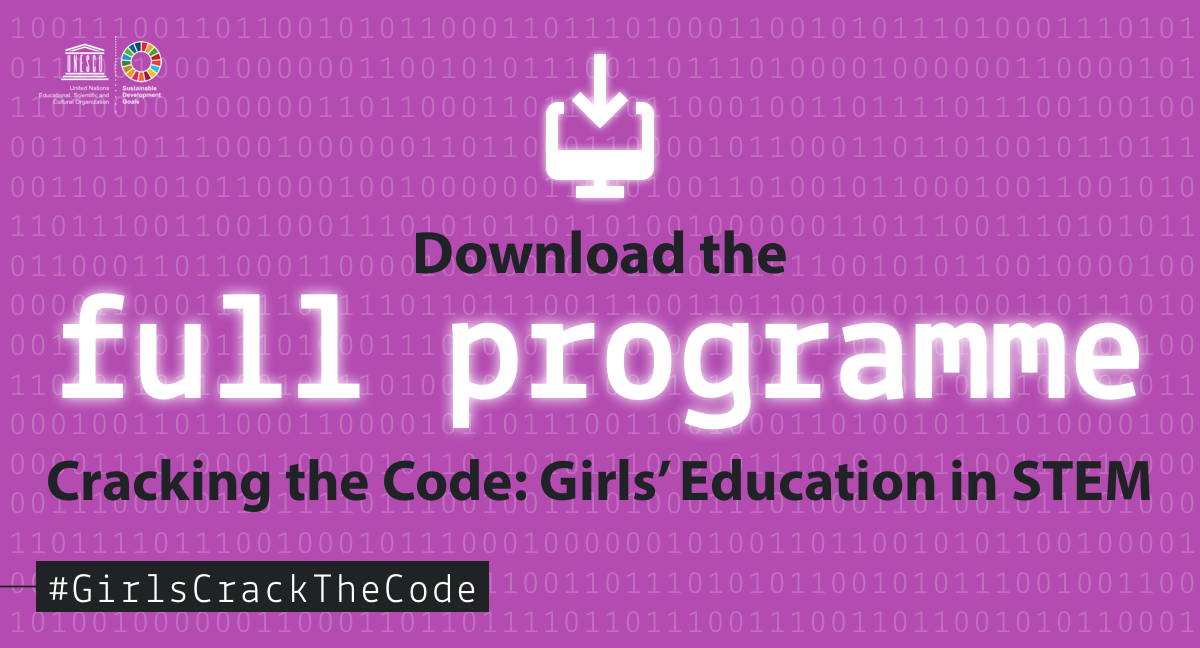
Post
The full programme for the UNESCO International Symposium and Policy Forum ‘Cracking the Code: Girls’ Education in STEM’ is now available. The programme features inspiring speakers from around the world, each dedicated to getting more girls into STEM who will challenge ministers of education and senior ministry representatives on how governments can better prioritise and promote STEM education for girls. Download the full programme at http://bit.ly/2xnU2yI.
UNESCO’s International Symposium and Policy Forum ‘Cracking the Code: Girls’ Education in STEM’ is being held in Bangkok, 28-30 August 2017. Find out more at http://bit.ly/2seiliH #GirlsCrackTheCode #BrightGirls
Tweet
The full programme for #GirlsCrackTheCode: Girls’ Education in #STEM’ is now available http://bit.ly/2xnU2yI #BrightGirls
Get the full programme for @UNESCO’s #GirlsCrackTheCode, getting more women & girls into #STEM http://bit.ly/2xnU2yI
Watch the #GirlsCrackTheCode opening video
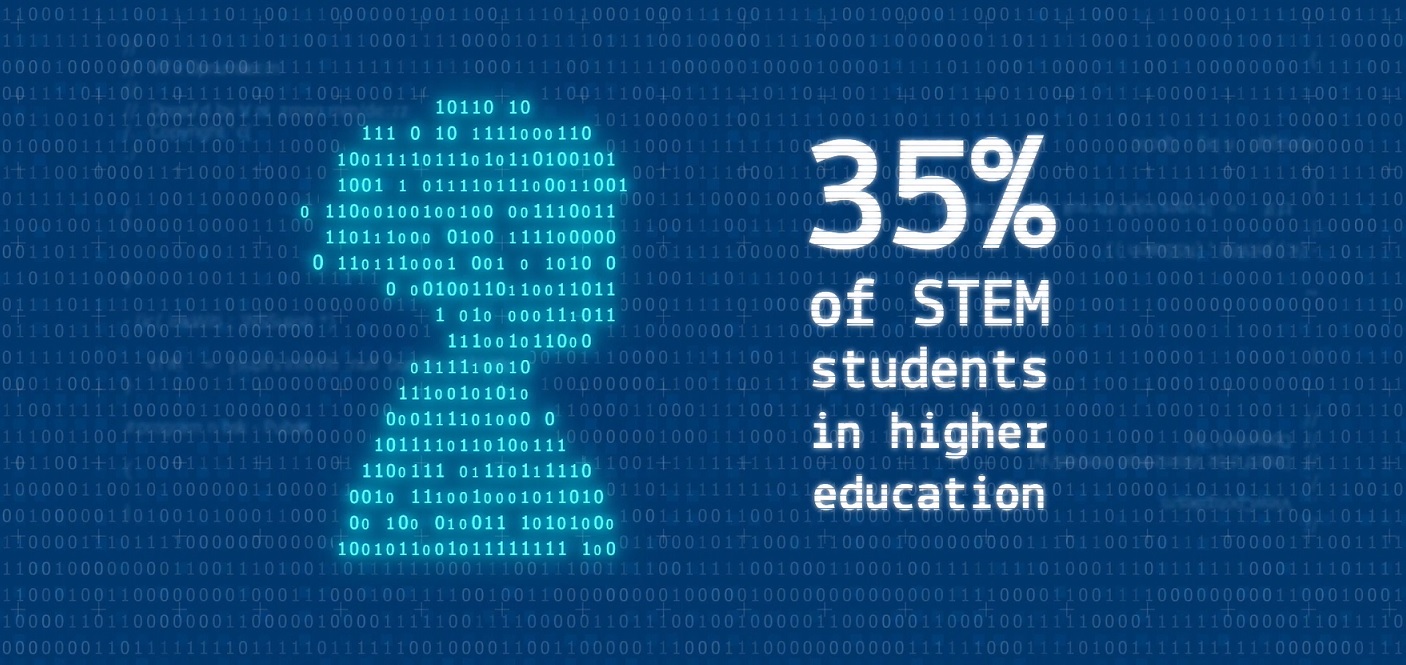
Post
As teachers, parents, practitioners, decision-makers, advocates and activists, we need you to inspire girls to reach their full potential, to teach and lead by example, to create opportunities and challenge stereotypes. Only then will we achieve inclusive, equal and quality education for all.
Watch the opening video of UNESCO’s International Symposium and Policy Forum ‘Cracking the Code: Girls’ Education in STEM’ (Bangkok, 28-30 August 2017) at https://youtu.be/3v59jGWK7NQ and find out more at http://bit.ly/2seiliH #GirlsCrackTheCode #BrightGirls
Tweet
We need you to inspire girls to reach their full potential in #STEM. Watch the #GirlsCrackTheCode video https://youtu.be/3v59jGWK7NQ #BrightGirls
Watch the opening video from @UNESCO’s #GirlsCrackTheCode https://youtu.be/3v59jGWK7NQ #STEM #WomenInSTEM #BrightGirls
Look out for our live scribing
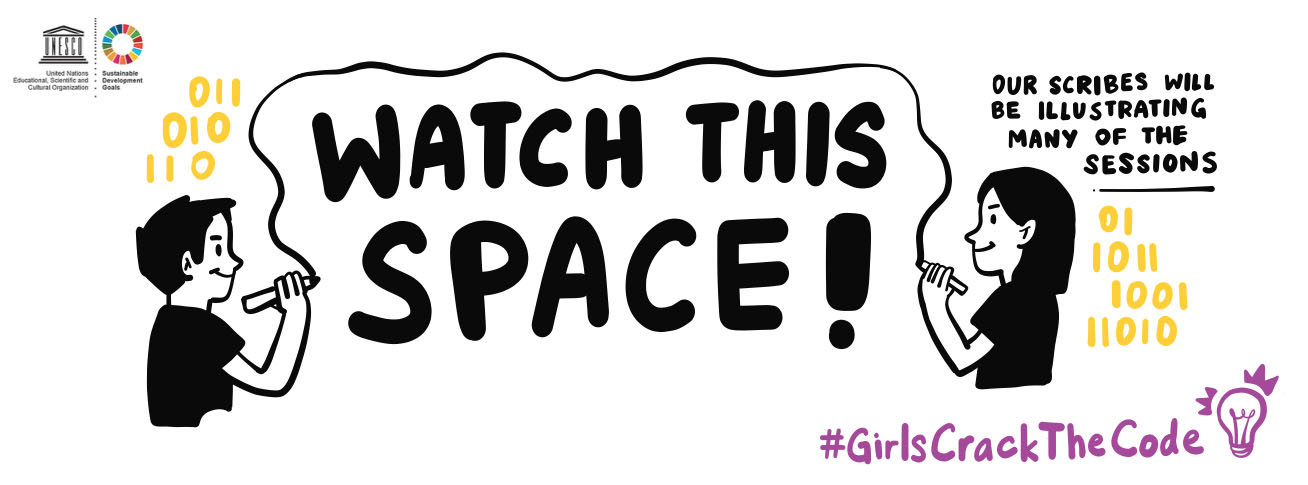
Post
At ‘Cracking the Code: Girls’ Education in STEM’, look out for our three scribes who will be illustrating many of the sessions. Afterwards, their boards will be exhibited in the main ballroom for delegates to reinforce what they’ve seen, heard and learned.
UNESCO’s International Symposium and Policy Forum ‘Cracking the Code: Girls’ Education in STEM’ is being held in Bangkok, 28-30 August 2017. Find out more at http://bit.ly/2seiliH #GirlsCrackTheCode #BrightGirls
Tweet
At @UNESCO's #GirlsCrackTheCode our scribes will be illustrating many of the sessions to aid & reinforce learning http://bit.ly/2wazTw1
All images can be downloaded here http://bit.ly/2w5fHgA


